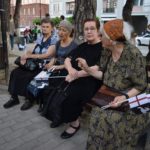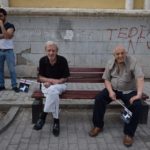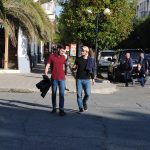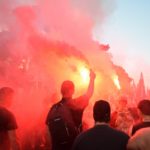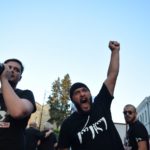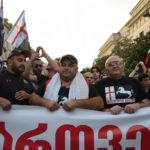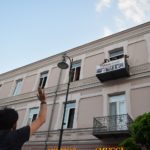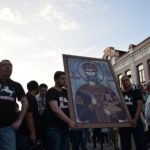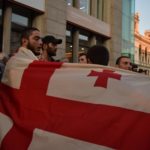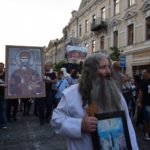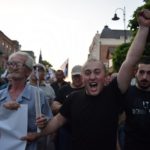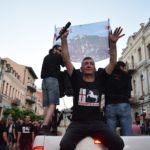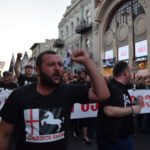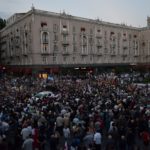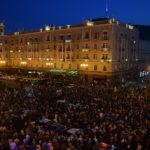

 Hundreds took to the streets in Tbilisi on 14 July, in a xenophobic, ethno-nationalist rally. The ‘March of Georgians’ railed against ‘illegal immigrants’, meaning anyone not Christian and white. But some on the far-right dissented against pro-Russian sentiments within the movement.
Hundreds took to the streets in Tbilisi on 14 July, in a xenophobic, ethno-nationalist rally. The ‘March of Georgians’ railed against ‘illegal immigrants’, meaning anyone not Christian and white. But some on the far-right dissented against pro-Russian sentiments within the movement.
Participants started to gather from 19:00 at a school on Tbilisi’s Aghmashenebeli Avenue. Aghmashenebeli, a central street with an array of restaurants serving a variety of national cuisines provided a potent symbol in the far right’s narrative of an ‘immigrant takeover’.
Several Arab, Iranian, and Turkish restaurants and bars on the avenue closed early, after rights group No to Phobia issued a warning that the rally could turn violent. Many tourists and passers-by also stayed indoors.
At around 20:00, a group of young men in matching black t-shirts adorned with the cross and unicorn flag of King David the Builder (Davit Aghmashenebeli), rushed through the crowd and the march got underway.
(Luka Pertaia/OC Media)
It was led by a barefoot priest and an icon of King David, from whom organisers claimed inspiration. King David led the Kingdom of Georgia to victory over the Great Seljuk Empire (a mediaeval Turko-Persian empire and predecessor to the Ottoman Empire) in the 1121 Battle of Didgori. The choice was an ironic one, given Aghmashenebeli’s role in bringing 40,000 Turkic Cuman-Kipchak families to Georgia in 1119, and his introduction of tax breaks for foreigners living in Tbilisi.
Organisers claimed to have been at least 4,000, whereas in the end, local media estimated the number of attendees as not more than 2,000. Accompanied by a heavy police presence, the rally ended at 22:30 without major incidents.
‘A march of Georgian men’
The sentiment of the demonstration — led and attended almost exclusively by men — was openly xenophobic and islamophobic. After Georgia’s former youth delegate to the UN, Tatia Dolidze, criticised the event, she was met with threats of violence and gang rape from leaders of the demonstration.
Protesters could be seen on a number of occasions stopping to shout racist abuse at observers on the balconies on Aghmashenebeli.
(Luka Pertaia/OC Media)
‘They should leave our country as soon as possible’, many of the protesters said. They claimed that the social and political problems facing the country could be easily be solved after this, as the departure of ‘foreign immigrants’ would open up new jobs.
None of the leaders of the rally have ever given a coherent economic plan, and their protests can mainly be seen as a manifestation of xenophobia, as stated, for example, by the Media Development Foundation, which monitored how the march was being supported on Facebook.
Organisers said the march marked the beginning of a new ‘national movement for freedom’, and referred to the late Zviad Gamsakhurdia, former dissident and the first president of Georgia, who was the leader of a nationalist awakening, stirring up a sentiment of ‘Georgia for Georgians’ in his supporters.
The organisers of the march
The event was promoted through social media after ultra-conservative political group Erovnuloba (Georgian for nationality) called on supporters to join the march through mainstream media.
Sandro Bregadze, a former deputy minister under the current government, was at the forefront of the movement. He called on all Georgians to join the rally ‘against illegal immigrants’ earlier in June, after local media reported a case of alleged sexual abuse against children. Coverage disproportionately emphasised the ethnicity of the accused.
Bregadze, a well-known homophobe who in 2014 labelled the head of queer rights group Identoba ‘single-celled’ and ‘sick’, resigned from his post in February 2016, after he claimed he was ‘asked to compromise his principles’ in support of same-sex marriage.
Given Georgia’s upcoming constitutional changes to define marriage as a union between a woman and a man, Bregadze and company have now chosen another target — ‘illegal immigrants’ — which is a term they use to justify hatred towards non-white, non-Christian people.
The march was also supported by the ultra-conservative Alliance of Patriots. Emzar Kvitsiani, a Member of Parliament from the Alliance of Patriots and a former military commander and warlord in Abkhazia, joined the demonstration.
Other notable political figures supporting the march included Lado Sadghobelashvili, a former member of the Alliance of Patriots, and Gia Kortokashvili, formerly a supporter of the ruling Georgian Dream. These were among a group of figures struggling to claw back political relevance with populist messages.
(Luka Pertaia/OC Media)
The many faces of Georgian nationalism
The rally was attended by hundreds of youngsters not associated with any political party or group, as well as a number of established conservative, nationalist, ultranationalist, neo-Nazi, and fascist groups and sympathisers, both online and in the streets, including the neo-Nazi Nationalist Socialist Movement — National Union of Georgia, who gathered in front of Dinamo Stadium before joining the main demonstration. But many in the far right did not attend, and the absence of a number of such groups who decided not to join, alleging that the organisers are ‘pro-Russian’, points to a split in the movement.
Three days prior to the march, members of the Alliance of Patriots held a controversial meeting with members of Russia’s State Duma, and at the end of the demonstration, one of the leaders, Gia Korkotashvili, urged Georgia’s government to ban non-governmental organisations funded by foreign countries.
This echoed a common narrative in the global alt-right movement — also pushed by the Kremlin — demonising Western funded NGOs, particularly George Soros and the Open Society Foundation.
Russia’s passed a law on ‘foreign agents’ in 2012 restricting the activity of NGOs receiving funding from abroad.
A number of prominent groups, such as ultranationalist football hooligans the Dinamo Ultras, and many others, abstained from joining the demonstration.

‘Bregadze has always been pro-Russian. Has he just decided to be patriotic now?’ one member of the Ultras told OC Media.
[Read on OC Media: Anti-Orbán demonstrators face off with far-right in Tbilisi]
Yet another strain of Georgian nationalism manifested in response to the ‘March of Georgians’, with a small group of demonstrators gathering in the village of Bershueti against the ‘Russia’s creeping occupation’.
Activists on social media criticised the organisers of the ‘March of Georgians’ for hypocrisy, with many saying that the nationalists had forgotten the fight against the ‘real enemy’, meaning Russia.
‘We would like to demonstrate to our fellow citizens and Georgia’s supporters abroad, that occupation is the most alarming problem for our country, not foreigners legally residing in the country’, their statement read.
The article was amended on 17 July 2017.
